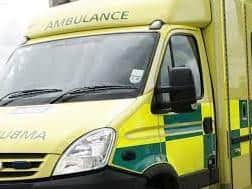Milton Keynes ambulance service struggles with sharp rise in 999 calls
and live on Freeview channel 276
South Central Ambulance Service is encouraging the public to use NHS 111 online for medical advice where possible because 999 calls are increasing so sharply.
They are currently receiving 15% more calls per day to 999 and blame the rapid Covid transmission rates, the hot weather and the increase in people spending time outside as restrictions ease.
Advertisement
Hide AdAdvertisement
Hide AdThe service's non-emergency Patient Transport Service is also experiencing higher demand than usual. Yet the Trust has a number of staff currently absent as a result of Covid-19 infection or self-isolation - though this is being mitigated through the redeployment of clinical staff from non patient-facing roles.


Today they are asking that people save the 999 service for genuine emergencies and call 111 instead if they simply need medical advice,
"The 111 online service offers patients quick advice on the best healthcare option, including a call back from a trained clinician or nurse, booking an appointment in A&E or providing advice on how to help patients recover," said a spokesman for South Central Ambulance (SCAS).
Call handlers have reported some calls to 999 in recent days have been for non-emergency issues such as insect bites, broken wrists, sunburn, vomiting and even profuse sweating. And the handlers have even suffered abuse when providing advice on how to self-treat and manage these conditions.
Advertisement
Hide AdAdvertisement
Hide AdPeople who call 999 are also being urged to only call back if their condition worsens – not to check what time their ambulance will arrive.
Paul Jefferies, Assistant Director of Operations at SCAS, said: “Our frontline ambulance crews, 999 and 111 call handlers and the many other teams who ensure we can respond to patients as quickly as possible are working extremely hard as we see increased demand for our services.
“We are prioritising those patients that are most sick and severely injured and everyone who needs an ambulance will get one, however, there are other and often better options for people to get the care they need.”
He added: “As has been the case throughout the pandemic, the public can play their part by using 111 online for urgent advice, calling 999 in life-threatening cases – and only calling back if their condition worsens – and by getting the COVID jab.”
Advertisement
Hide AdAdvertisement
Hide AdPeople are still being encouraged to contact 999 if they experience:
• signs of a heart attack like a pain like a heavy weight in the centre of the chest
• signs of stroke such as a person’s face dropping on one side
• difficulty breathing
• heavy bleeding that won’t stop
• seizures
• sudden and rapid swelling of the eyes, lips, throat or tongue.
Advertisement
Hide AdAdvertisement
Hide AdMr Jefferies paid tribute to staff and volunteers who are working flat-out across the organisation to contend with the current workload.
He said: “It is really important to us that whenever we convey information about the pressures we are facing to the public that we take time to thank our staff and volunteers for the extraordinary effort they have made and continue to.
“We are so proud of all of them and the challenges they have all faced since the start of the pandemic cannot be underestimated. My message to the public about our staff and volunteers is please continue to be kind, considerate and supportive.
“We also want to remind everyone that our staff will still wear appropriate personal protective equipment (PPE) and observe “Hands, Face, Space” to protect themselves and our patients.”
Advertisement
Hide AdAdvertisement
Hide AdNational Strategic Adviser of Ambulance Services, NHS England and NHS Improvement, Anthony Marsh, said: “This is a really tough time for ambulance staff who are working round the clock to deal with an increased number of calls and I’d like to pay tribute to their continued efforts to ensure patients get the care they need.
“With pressure on services still high, the public can help us to help them by using 111 online to get medical advice, and of course the most important thing we can all do at the moment is get the Covid-19 vaccine - both doses - which protects us, our families and friends and will help to reduce pressure on the NHS as well.”